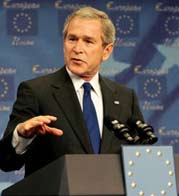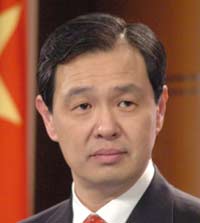|
Bush threatens Europe on ending arms ban
(Agencies/Xinhua)
Updated: 2005-02-23 08:47
US President Bush warned Tuesday in Brussels that US Congress might retaliate
if Europe revokes the 15-year arms ban on China.
Bush said lifting the embargo "would change the balance of relations" between
the Chinese mainland and Taiwan and "that's of concern." But French President
Jacques Chirac and German Chancellor Gerhard Schroeder said the ban should go.
"It will happen," Schroeder said.

U.S. President George W Bush gestures during a
media press conference at the EU Council building in Brussels, Tuesday
Feb. 22, 2005. [AP] | Before Bush's trip to
Europe, US Congress sent a clear warning to Europe about lifting the arms
embargo on China. In a 411-13 vote, the House said revoking the ban would
endanger both Taiwan and U.S. troops stationed in Asia and would harm U.S.
relations with Europe.
Hinting at trade retaliation, the House resolution noted that the United
States and Europe cooperate on the governmental and industrial level. It said
lifting the embargo "would necessitate limitations and constraints in these
relationships that would be unwelcome on both sides of the Atlantic."
Bush said he understands that the Europeans are working on a way to address
U.S. worries about allowing China to modernize its military with arms and
communications, intelligence and surveillance equipment that would give Beijing
an edge over Taiwan.
"They know the Congress is concerned," Bush said. "And so they'll try to
develop a plan that will ease concerns. Now, whether they can or not, we'll
see."
![French President Jacques Chirac speaks at a press conference at the European Council in Brussels February 22, 2005. The European Union intends to end its ban on arms sales to China, French President Jacques Chirac said after talks with US President Bush, who highlighted Washington's security concerns. [Reuters]](xin_16020223085359374543.jpg)
French
President Jacques Chirac speaks at a press conference at the European
Council in Brussels February 22,
2005. [Reuters] | Chirac said the
European Union intends to end its ban on arms sales to China.
"With regard to China, Europe intends to remove the last obstacles to its
relations with this important country," Chirac told a news conference just
before all 25 EU leaders began a summit with Bush.
He said the embargo was no longer justified but the EU would ensure its
abolition did not change the strategic balance in Asia. He noted that U.S.
allies Canada and Australia did not have such restrictions on arms sales to
Beijing.
To allay US worries, Chirac said security guarantees could be worked out.
China: Lifting arms ban hurts no third parties
Chinese Foreign Ministry spokesman Kong Quan maintained that the European
Union's plan to lift its arms embargo on China won't infringe upon the interest
of third parties, and that the lifting of the embargo is "irrelevant" to "the
present situation of the Asia Pacific region."

Kong Quan [filephoto] | Kong told a regular
press conference that the arms embargo, put in place in 1989, is a "sequel of
the cold war," and the lifting of it is "conducive to a sound and smooth
development of the China-EU relations based on equality and reciprocity."
"The bilateral relations enjoy a smooth development at present, while the two
sides are gradually solving historical problems between them," Kong said. He
said he hopes that the United States will temporize to the trend instead of
setting obstacles.
Kong said the lifting of embargo is actually "the lifting of political
discrimination on China, which won't lead to China to buy a large amount of
weapons." China, he said, will "pursue peaceful development and a defense policy
that is defensive in nature," and will be "no menace to any country."
He said, "China is not the obstacle to the world peace and stability but an
active strength to maintain it."
| |
 |
|
 |
|
|
Today's
Top News |
|
|
|
Top China
News |
 |
|
 |
|
|
|
|
|
|


